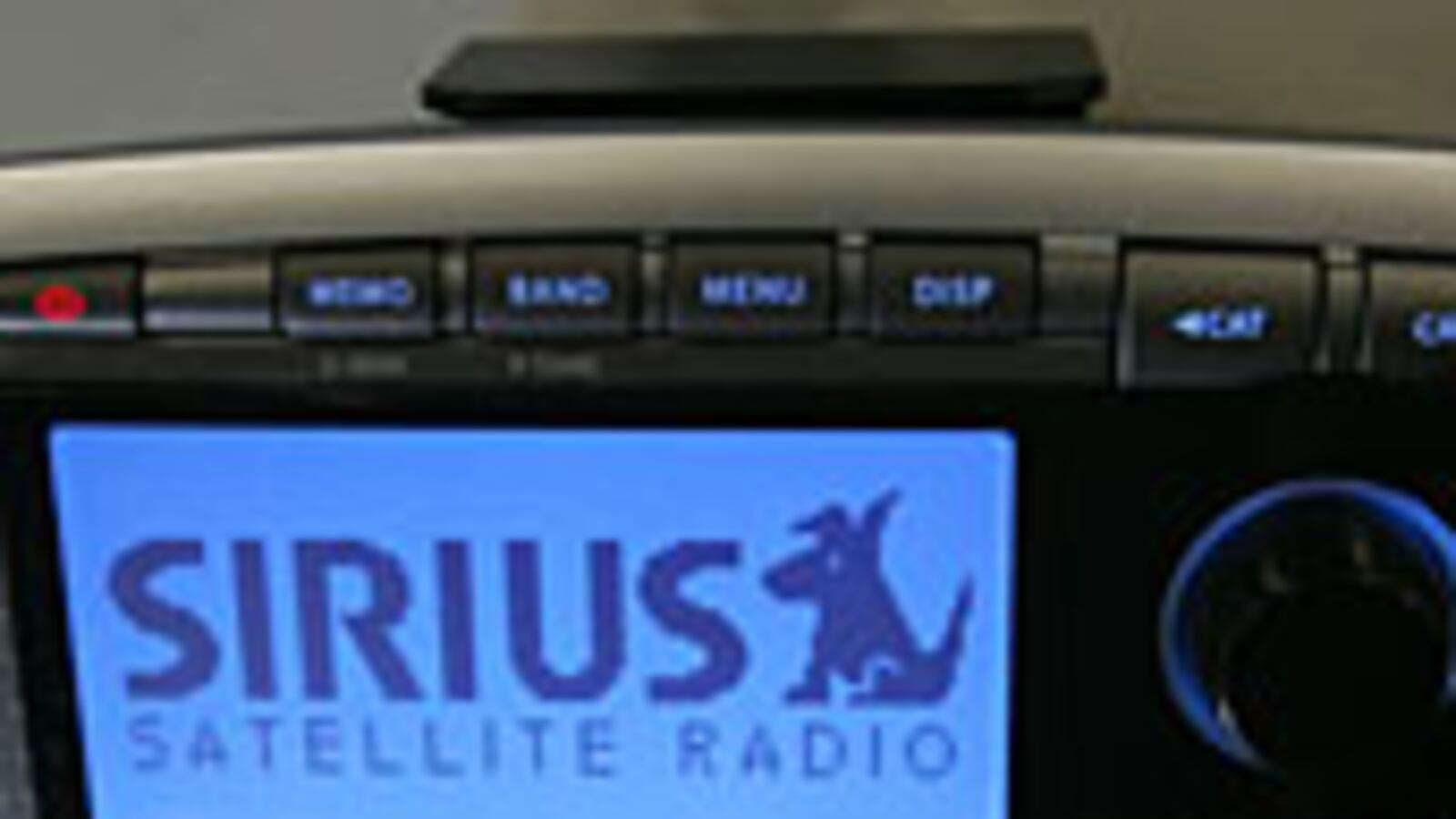
The relentlessly bad news from the auto industry’s Big Three—including Monday’s anticipated General Motors bankruptcy—is creating an unintended casualty: Mel Karmazin, and his company, Sirius XM Radio, which has relied on new cars being sold equipped with satellite radio.
The embattled mogul, who once enjoyed a worshipful following among Wall Street investors, watched Sirius’s stock price tank by more than 30 percent recently. The selloff came after the company said that its number of subscribers fell by 400,000, from 19 million to 18.6 million, in the first three months of this year. Never before had the company lost subscribers from quarter to quarter, and investors reacted with panic.
In a dubious ploy (albeit transparently dubious, and completely lawful), Sirius has been counting millions of “subscribers” who never pay a penny out of their own pockets for the service.
While Detroit’s implosion is the main culprit, Karmazin is also getting his inevitable comeuppance for a longtime practice of hyping his company’s numbers. In a dubious ploy (albeit transparently dubious, and completely lawful), Sirius has been counting millions of “subscribers” who never pay a penny out of their own pockets for the service. These customers get it free for six months to 18 months in promotional trials that are paid for by automakers such as Chrysler, which install the satellite-radio hardware in new cars. Fewer cars sold, fewer trial subscribers.
Karmazin is simply taking part in a long and lemming-like tradition in the car business of inflating the one number that everyone looks at—the overall sales figure. For many years the big automakers sold fleets of vehicles to the big rental-car companies, which they owned, meaning essentially that they sold cars to themselves rather than to real-life consumers who were willing to pay hard-earned money for Detroit’s latest clunkers. Still, it’s surprising that Karmazin, of all people, would try a similar stunt, since he had built a reputation in his earlier gigs (including a stint running CBS) as the consummate straight shooter. Even as a big-shot CEO, Karmazin had the bluntness you might expect from his roots as the son of a taxi driver. He grew up in a public housing project in Queens and began his career in a mail room while he was still in high school.
So, what changed? The hype factor dates back to before Sirius merged with rival XM, when they were separate companies competing ferociously to be the No. 1 in their emerging business. “There was… a time when the focus was on adding subscribers at any cost,” Karmazin himself said recently in a conference call with securities analysts.
The “subscriber” decrease was entirely predictable by anyone who has been paying attention to this industry, so it’s curious that investors responded as if they were shocked. The more telling statistic: the number of customers who actually pay for Sirius XM’s service themselves, which fell by around 100,000, from 15.5 million to 15.4 million, which isn’t that horrible in light of the awful state of the economy as well as Sirius’s price increases.
While Karmazin isn’t shooting as straight as he used to, the rest of his modus operandi remains much the same as when he was beloved on Wall Street. Years ago I wrote that he was an “obsessed workaholic” with “a hyperaggressive, bullying, in-your-face style, a fearsome micromanager who even scrutinizes his underlings’ long-distance phone bills and overnight mail receipts…” He’s still famously tight-fisted: Sirius XM’s operating costs declined by 23 percent in the first quarter, partly in savings from merging the two companies. Still, Sirius XM has huge costs that it can’t really do anything about: The Sirius channels rely on three satellites up there in space, which will have to be replaced at great expense at some point, and the XM channels rely on their own set of satellites that aren’t interchangeable with Sirius’s. If the two companies hadn’t merged, the costs would have surely killed off the whole business. Even as a single operation, the outlays are still staggering. Karmazin’s biggest problem isn’t the ire of his shareholders; it’s making the payments on Sirius’s hundreds of millions of dollars of debt. Sirius recently avoided having to declare bankruptcy only because media mogul John Malone bailed it out.
On the upside, the Sirius-XM merger will ultimately mean that Karmazin will pay much lower costs for content, avoiding the earlier bidding wars for exclusive rights to programming such as Howard Stern’s show or Major League Baseball games. When those deals come up for renewal, there’s no other party to drive up prices. But the big-money content may have been a handicap in certain ways: While Karmazin has relied on Stern and sports, Sirius hasn’t created its own break-out, buzz-generating hits, which raises questions about who’s really listening these days. A declining audience, plus dozens and dozens of channels, equals a tepid amount of listeners of any individual station. When Howard Stern signed up with Sirius, he was the self-proclaimed King of All Media. Now, how frequently do you hear his name?
The question remains, though, whether Mel Karmazin, who’s as smart, shrewd, and tenacious as just about any CEO anywhere, can figure out a long-term strategy for making the satellite-radio business succeed. Americans are accustomed to getting radio for free, but Sirius XM asks them to pay up even though it runs commercials on its music channels. And what are the prospects for Sirius as new cars begin to enable us to plug in our iPhones and connect wirelessly to the Internet and to cool services such as Pandora, which lets us control and customize the programming that we personally desire? Satellite radio may wind up being an interim technology for the short time between the long ascendancy of old-fashioned broadcast radio and the new era of Internet on the run. Salvaging its future might be beyond even the talents of a legend like Mel Karmazin.
Alan Deutschman is a Daily Beast columnist. His next book, Walk the Walk: The #1 Rule for Real Leaders, will be published in September by Portfolio. He is also the author of Change or Die, A Tale of Two Valleys, and the Second Coming of Steve Jobs. He has been a Silicon Valley correspondent for Fortune, the “Profit Motive” columnist for GQ, a senior writer at Fast Company, and a contributing editor at Vanity Fair and New York Magazine.






